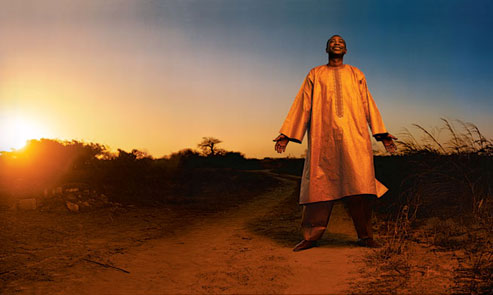Youssou N'Dour: I Bring What I Love
 The best known African singer in the world, the most significant cultural figure in Senegal, the voice that 'Rolling Stone' described as perhaps containing the whole of the continent (though I'm not sure whether that's a kind of silly post-colonial statement or a magnificent expression of what it can do), father, son, brother, political activist, mystic, and frankly one of the most obviously attractive human beings I've ever seen, Youssou N'Dour is the subject of a new documentary by Elizabeth Chai Vasarhelyi, 'I Bring What I Love', which I saw last night at the Nashville Film Festival.
The best known African singer in the world, the most significant cultural figure in Senegal, the voice that 'Rolling Stone' described as perhaps containing the whole of the continent (though I'm not sure whether that's a kind of silly post-colonial statement or a magnificent expression of what it can do), father, son, brother, political activist, mystic, and frankly one of the most obviously attractive human beings I've ever seen, Youssou N'Dour is the subject of a new documentary by Elizabeth Chai Vasarhelyi, 'I Bring What I Love', which I saw last night at the Nashville Film Festival.
And what a film it is. We follow N'Dour's tour of 'Egypt', an album of Sufi devotional music whose sound envelopes the audience in a transcendent challenge to the populist 'understanding' of Islam post-9/11; Youssou's experience of his own religion is one in which generosity to the stranger, peace among neighbours, and celebration at the drop of a hat are the common marks. Even when these are not the means by which the faith is manifested - we all fail to live up to our best traditions - Youssou N'Dour appears so committed to its outworking that he even has a problem with the violence necessary to slaughter a lamb at a sacred feast. This may be the most telling moment in the film, for it includes the moment in voiceover when he admits that even pushing 50, every time he is in the presence of his father, he feels like he's '15 years old'. It's at that point that so many of us will identify with him - and maybe hope that we are all doing better at life than we give ourselves credit for.
'I Bring What I Love' is not the most clearly structured film; I felt it was about a quarter of an hour too long, and the story became repetitive after a while - but these are tiny concerns far outweighed by the sheer human vitality on display in the form of this man, an heir of the 'griot' tradition who suffered insults from his own country for trying to fuse religion and popular culture; a global superstar willing to let a camera crew observe him relating to his frail grandmother without it seeming exploitative or publicity-hugging; a person who appears to be living from his best self, or at least his most self - he's not letting pain or difficulty get in the way of figuring out what it means to be a fully human being.
And the scene when a Dublin audience is gently admonished to drink up because Senegalese Sufi musicians don't want to play devotional music while alcohol is being consumed (and the audience politely agrees, even applauding the invitation) seems to me to be a sign of hope that marks the best consequences of globalisation. Youssou N'Dour's music invites us to consider the religious cliche that we are all one. So far, so what? Well, what can I say to that? If you don't listen to the music, you won't know why I'm so excited about this film, and the life-altering potential presented in essence in its title.